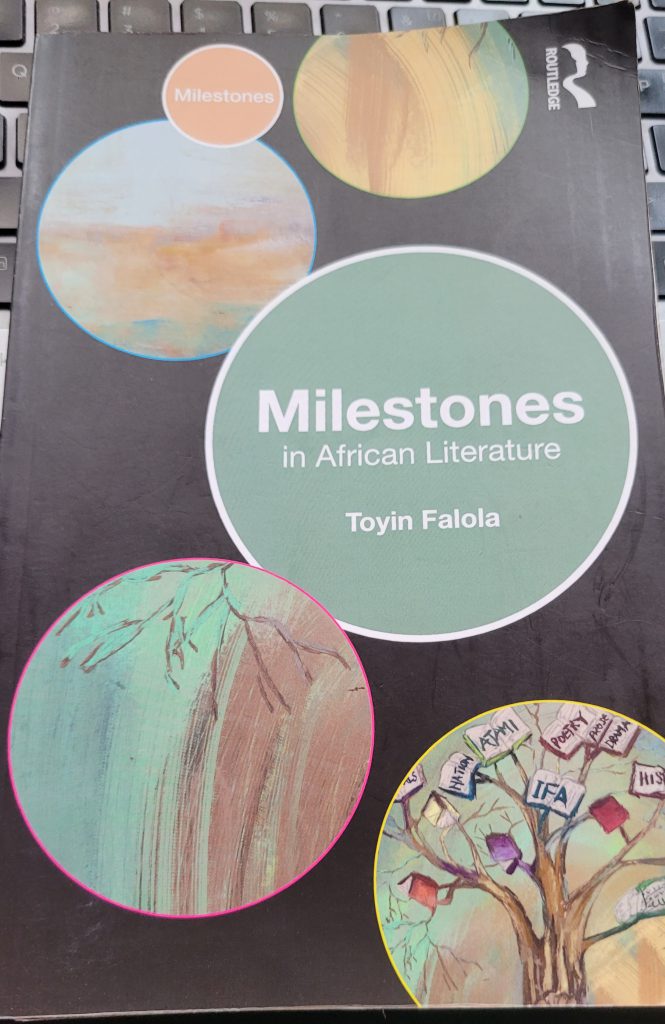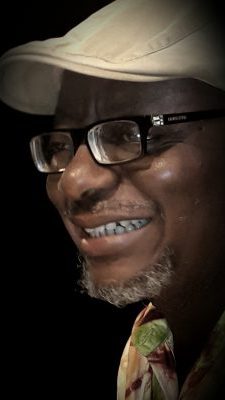By Olayinka Oyegbile
The best advice I ever got was that knowledge is power and to keep reading – David Bailey
(A review of Milestones in African Literature, Toyin Falola, Routledge, 2025)
At a first look, the title of the book Milestones in African Literature looks queer. You ask yourself what is this about? However, after a dive into the first few pages, the author explains the rationale for the title. According to him, “This book, while isolating the “ten” great “moments” of African literature, features a major strength in capturing traditional to contemporary digital forms of African literature.” (pix).
That explained and in what he calls “the nexus of African literature in its diversity”, Toyin Falola, a professor of humanities at the University of Texas at Austin, USA, takes the reader on an exciting journey of these ten milestones. In dealing with these, the book in each chapter takes a particular milestone and deals with it in detail and with examples drawn from oral, written and performance texts.
Of course, what is today termed literature in Africa started with oral performances before the advent of the written word. This has been widely dealt with by scholars of African descent and others. On the importance of oral literature, he writes, “Oral literature plays a huge role in identity and cultural preservation…It is often used as a form of healing and therapy in African communities. It allows people to express their emotions, fears, and hopes…” That was not all, it was also used as a resistance tool and for activism, he states.

The book also looks into the written text before the advent of colonialism. This tackles the fact of the existence of writing that predated colonialism looking at it from the socio-cultural dimensions and from the Nsibidi tradition which are “considered at the crossroads of writing and orality.” Of course, the colonial period came with its peculiar challenges and led to what could be considered as the rise of the written literature on the continent. The discussion cannot, but the traced to Joseph Conrad’s book which many considered racist and therefore led to the idea of writing about Africa from the African perspective to beat back the tale of the colonist.
Another milestone of literature on the continent was the Apartheid system in the southern part of Africa. This led to a multiplicity of voices struggling to convey to the other parts of the world the realities of life at this period. The author recognizes the pioneering work of Thomas Mafolo who wrote about the life of Shaka, the Zulu king. According to him, “Mafolo’s decision to write in Sesotho signified a significant departure from colonial linguistic domination, affirming the significance of African languages in literary expression. His work serves as an early exemplification of decolonisation through literature.” This chapter chronicles the period of Apartheid, resistance to the Rainbow nation and the change in direction after majority rule.
The Negritude movement as enunciated by the likes of Leopold Sedar Senghor to proclaim their Africanness is also examined. Tracing the influence of the Negritude movement through the Harlem renaissance and the Caribbeans, it works the reader through these multi experiences and how it was used as a movement to rehabilitate the African identities through their literature.
It goes without saying that the issue of language(s) in which African literature is written is the big elephant in the room. From the 1962 conference of African writers in Makerere to this day, the issue of language cannot be swept away. Although Ngugi wa Thiong’o and Chinua Achebe have been at the forefront of the language debate, Falola writes that, “The groundbreaking endeavours of Benedict Walter Vilakazi, the inaugural Black South African to obtain a doctoral degree for his research on Zulu and Xhosa languages, establish a significant historical backdrop for these discussions.”
Ngugi has since broken away from the shackles of writing in a colonial language by writing first in Gikuyu and translating later to English. According to him, there should be no debate about which language is superior, and speakers of any language should not try to suppress other languages. According to him, “Every language has a right to be spoken, even if only five people speak it, because it is democratic and a human right.” This chapter on language debate would no doubt be the most referenced portion of the book because of its importance and the detail work the author did on the debate.
Other sections on the print media and popular literature goes ahead to examine the importance of the print media and how it has helped to popularise literature. Tracing it through the colonial period and how it was used to spread the gospel of colonization and later used by the citizens as weapon to campaign for their liberation and decolonisation, too.
The postcolonial and postindependence period too are treated in detail and what has come to be referred to as Migration Literature takes a very prominent part of this consideration. From its definition to how migration has been part of human history because of its “push and pull” elements. The consideration of this important topic and how various African writers have treated it in their books is a crucial study of literature in Africa. It is good that Falola as an eminent Historian decided to deploy his knowledge in this field to tackle this.
The advent of internet, which has disrupted and changed the world in a way that Marshall McLuhan perhaps never envisaged when he wrote about the world as “a global village” many years ago. The digital culture has changed the face and phase of literature and everything, as it has done to other fields. This writer thus says, “African writers are taking advantage of these developments by creating contents of different genres on social media platforms…The literature of cyberspace does not only explore new topics and stir up interesting conversations but also deals with theses that affect political climates people live in.”
With Milestones in African Literature, Falola can be said to have scored another bull’s eyes. This is a book that is a rich resource for students of literature, history, sociology in fact, humanities in general. The author has deployed his expertise as a historian to write a book that one finds entertaining and educative and rich in gems knowledge.


